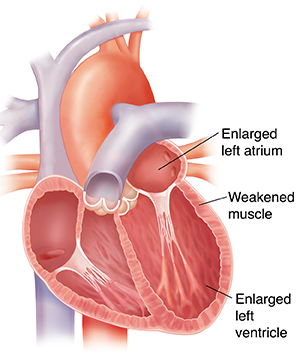What Is Dilated Cardiomyopathy?
If you have cardiomyopathy, you have a problem with the muscle tissue that makes up your heart. Dilated cardiomyopathy is the most common type of cardiomyopathy. It happens when the walls of the heart become thin and the heart gets larger. As a result, your heart may not be pumping as well as it should. This can cause severe problems for the rest of your body. It can also make existing heart problems worse. You and your healthcare provider can work together to help your heart function better and reduce the effects on your life.
.

Dilated cardiomyopathy can occur from:
Symptoms of dilated cardiomyopathy
Common symptoms include:
-
Shortness of breath, especially when you exert yourself
-
Unexplained tiredness
-
Chest pain
-
Fluid buildup in the lungs. You may need extra pillows to prop you up so that you can breathe better when you lie down.
-
Fluid buildup causing swollen feet or ankles or unexplained weight gain
-
Heart skipping beats, fluttering, or thumping
-
Fainting, dizziness, or lightheadedness
-
Swelling of the veins of the neck
-
Swelling in the belly (abdomen) with less appetite
When you have dilated cardiomyopathy
With dilated cardiomyopathy, the heart muscle has been damaged. A damaged heart muscle can't pump as much blood as a normal heart. To try to pump enough blood, the heart muscle stretches so it can hold more. The chambers, especially on the left side of the heart, often get larger (dilate). Larger chambers may help move more blood for a while. But in time, the stretched-out muscle gets even weaker and tires out. This causes problems with sending blood to the rest of your body. It makes it harder for your heart to work.
Treatment for dilated cardiomyopathy
Dilated cardiomyopathy often doesn’t go away. But it can be treated. Treatment can help keep cardiomyopathy from getting worse. It can also ease your symptoms. Treatment can also help prevent:
-
Worse heart failure
-
Blood clots
-
Heart valve problems
-
Heart rhythm problems
Your healthcare provider will work with you to develop a treatment plan. The aim of the plan is to help you feel better now and prevent problems in the future. Most often, the symptoms can be managed by medicines and lifestyle changes. Some people have severe symptoms. They need to go into the hospital. They may need advanced treatments, such as mechanical assist devices or a heart transplant.
Following your treatment plan
Your treatment plan may include:
-
Making lifestyle changes, such as balancing activity and rest, quitting smoking, and tracking your weight
-
Eating less salt, as advised
-
Taking all medicines as prescribed by your healthcare provider
-
Limiting or giving up alcohol
-
Keeping track of how you feel in a journal
Call your provider right away if you have symptoms that are getting worse.
See your healthcare provider regularly. Talk about any problems you are having with your treatment plan. Be honest if you are not doing something your provider has suggested. They may be able to make some changes to help your plan work better for you.
Online Medical Reviewer:
Lu Cunningham
Online Medical Reviewer:
Mandy Snyder APRN
Online Medical Reviewer:
Steven Kang MD
Date Last Reviewed:
1/1/2022
© 2000-2024 The StayWell Company, LLC. All rights reserved. This information is not intended as a substitute for professional medical care. Always follow your healthcare professional's instructions.